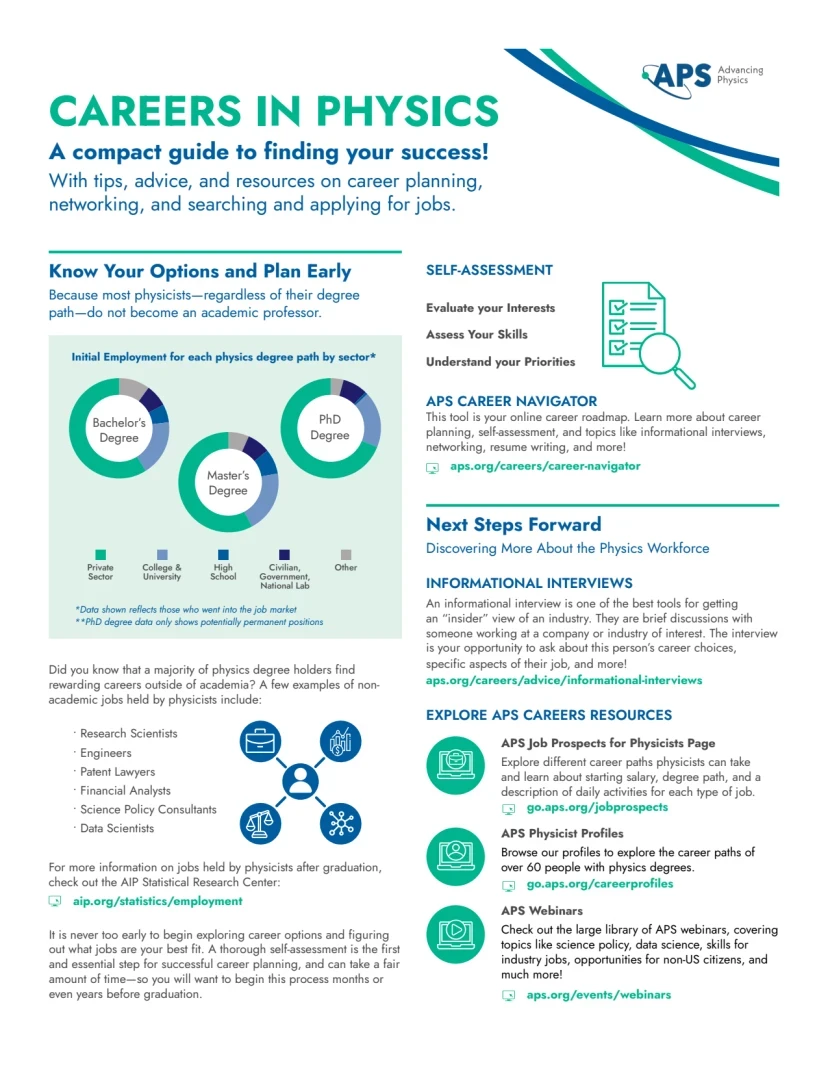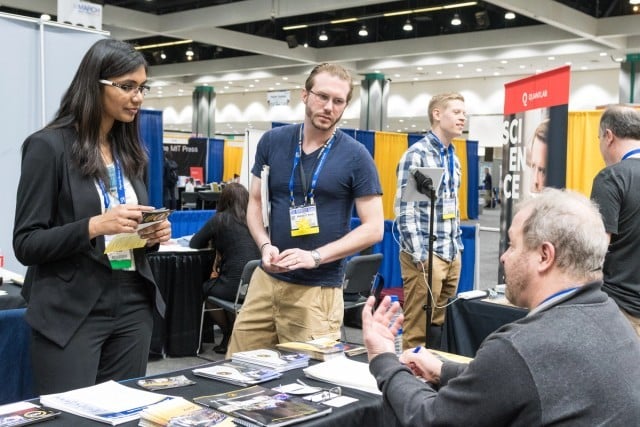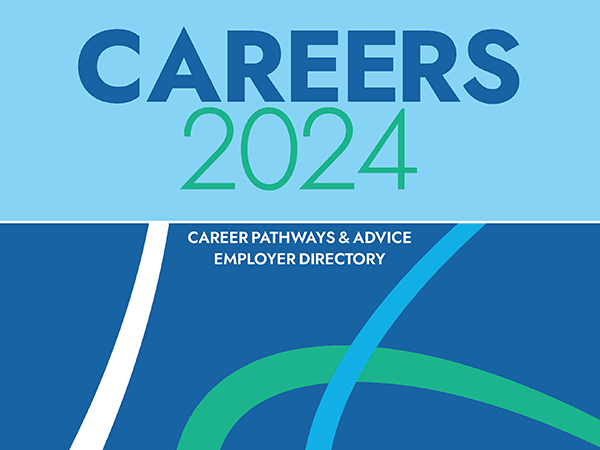Find Your Success in Physics
A compact guide to physics careers with tips, advice, and resources on career planning, networking, and searching and applying for jobs.

Know your options and plan early
If you would like a printable version of this content, please download our brochure (PDF).
Did you know that a majority of physics degree holders find rewarding careers outside of academia? Most physicists, regardless of their degrees, don't become academic professors. Instead, the majority of physics majors with bachelors, masters, or PhD's work in the private sector. A few examples of non- academic jobs held by physicists include:
- Research scientists
- Engineers
- Patent lawyers
- Financial analysts
- Science policy consultants
- Data scientists
The American Institute of Physics (AIP) Research Center has more data on jobs held by physicists after graduation.
It is never too early to begin exploring career options and figuring out what jobs are your best fit. A thorough self-assessment is the first and essential step for successful career planning, and can take a fair amount of time — so you will want to begin this process months or even years before graduation. Through a self-assessment, you can:
- Evaluate your interests
- Assess your skills
- Understand your priorities
The APS Career Navigator is a tool that can serve as your online career roadmap. Review the articles in the Career Navigator to learn more about career planning, self-assessment, and topics like informational interviews, networking, resume writing, and more.
Next steps forward: Discover more about the physics workforce
Explore the many career opportunities available to you with a physics background.
Informational interviews
An informational interview is one of the best tools for getting an “insider” view of an industry. They are brief discussions with someone working at a company or industry of interest. The interview is your opportunity to ask about this person’s career choices, specific aspects of their job, and more.
APS career resources
Through APS, you can discover the many career fields that seek to hire physicists, read stories about physicists' career journeys, and attend our career webinars:
- Career options for physicists: Explore different career paths physicists can take and learn about starting salary, degree path, and a description of daily activities for each type of job.
- Physicist profiles: Browse our profiles to explore the career paths of over 60 people with physics degrees.
- Webinars: View our large library of webinars, covering topics like science policy, data science, skills for industry jobs, opportunities for non-US citizens, and much more.
Building networks
Experts estimate that about 80% of jobs are found through networking, so having a strong network is extremely important. There are many resources, through APS and other organizations and websites, that can help you connect with mentors, collaborators, and others in your field:
- APS Industry Mentoring for Physicists (IMPact): IMPact connects you directly with industry physicists. If you’re not sure where to start networking, sign up for APS IMPact and search for mentors by field of work, demographics, location, interests and hobbies, and more.
- National Mentoring Community (NMC): The NMC connects historically marginalized and minoritized students with a network of mentors to support them on their academic and career journeys.
- APS meetings, job fairs, and exhibits: Attending conferences is a fantastic way to expand your network. To get the most out of APS meetings, attend career panels and networking events, as well as the APS Career Fairs, and visit the exhibit hall.
- Future of Physics Days: Each year, APS and the Society of Physics Students team up to offer events just for undergraduates at the annual meetings. Events include a grad school fair, career panels, undergraduate research sessions, and more.
- LinkedIn®: A feature of LinkedIn® is that it will show you how many “degrees of separation” exist between you and a company or person. If that degree is two or less, you could ask your connection for an introduction. The more connections you build, the larger your potential reach.
Searching and applying for jobs
Searching and applying for jobs can seem like a challenging process, but there are many resources available to help you.
APS physics job board
The APS Job Board can put literally hundreds of science employment opportunities at your fingertips! Job seekers can store multiple versions of their resumes, set up job alerts, and perform targeted keyword searches—all for free.
CV and resume help
Most industry job postings you find will likely ask for a resume, not a CV! While CVs are comprehensive, broad, tend to be long, and are required for academic positions, resumes are generally one to two pages in length and only include skills and experiences that are relevant to a specific job description.
For more tips on writing a good resume, review the information in the Resume Guide of the APS Career Navigator.
Interviewing and negotiation
When your resume does its job, you will need to prepare for a successful interview by doing the following:
- Review the job description and be prepared to address how your skillset is a good match
- Look up common interview questions and practice with a friend
- Prepare some questions that you might want to ask
- For more tips on interviewing and negotiation, see the APS Career Navigator
APS is here to help
While physics is one of the most employable majors, a majority of graduates find work in non-academic sectors. So, it is essential that you begin learning about options and planning your career early.
APS is invested in your success as an early career physicist and has developed a host of resources on our careers website to help you discover your path forward. You can get started on our Careers page or contact the APS Career team via email.




